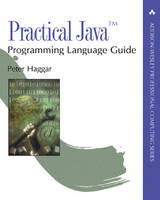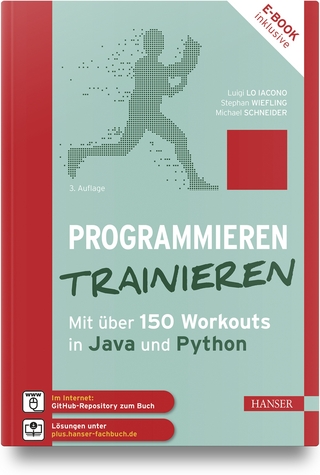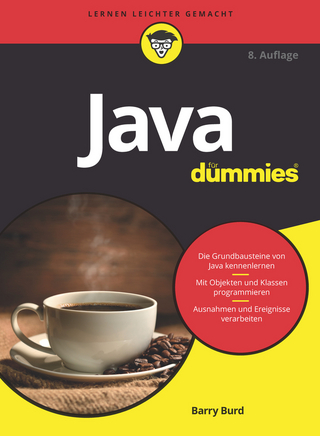
Practical Java™ Programming Language Guide
Addison Wesley (Verlag)
978-0-201-61646-0 (ISBN)
- Titel ist leider vergriffen;
keine Neuauflage - Artikel merken
This book does for Java what Scott Meyers' classic Effective C++ did for C++: identifies the key practices and rules that enable good developers to become great developers. IBM Java expert Peter Haggar brings together 68 rules for writing better Java 2 code, complete with insightful discussions and real-world examples. These are the "rules of thumb" expert developers have discovered: guidelines that consistently lead to clear, correct, and efficient code. Haggar focuses on the key issues virtually every Java developer faces, from general techniques (such as when to use polymorphism and when not to use method overloading); to working with objects, exception handling, performance, multithreading, classes, interfaces, and beyond. Haggar has a remarkable talent for crystallizing a problem and solution, and communicating it in words and code. The result: a book that can help any Java developer get dramatically better results -- fast.
Peter Haggar is an acknowledged expert on Java programming and a Senior Software Engineer at IBM. He has a broad range of programming experience, having worked on development tools, class libraries, and operating systems. At IBM, he works on emerging Java technology and is currently focusing on embedded and real-time Java. Peter is also a frequent technical speaker on Java technology at numerous industry conferences. He received a B.S. in computer science from Clarkson University. 0201616467AB04062001
Preface.
Acknowledgments.
GENERAL TECHNIQUES.
Praxis 1: Understand that parameters are passed by value, not by reference.
Praxis 2: Use final for constant data and constant object references.
Praxis 3: Understand that all non-static methods can be overridden by default.
Praxis 4: Choose carefully between arrays and Vectors.
Praxis 5: Prefer polymorphism to instance of.
Praxis 6: Use instance of only when you must.
Praxis 7: Set object references to null when they are no longer needed.
OBJECTS AND EQUALITY.
Praxis 8: Differentiate between reference and primitive types.
Praxis 9: Differentiate between == and equals.
Praxis 10: Do not rely on the default implementation of equals.
Praxis 11: Implement the equals method judiciously.
Praxis 12: Prefer get Class in equals method implementations.
Praxis 13: Call super. equals of base classes.
Praxis 14: Consider carefully instance of in equals method implementations.
Praxis 15: Follow these rules when implementing an equals method.
EXCEPTION HANDLING.
Praxis 16: Know the mechanics of exception control flow.
Praxis 17: Never ignore an exception.
Praxis 18: Never hide an exception.
Praxis 19: Consider the drawback to the throws clause.
Praxis 20: Be specific and comprehensive with the throws clause.
Praxis 21: Use finally to avoid resource leaks.
Praxis 22: Do not return from a try block.
Praxis 23: Place try/catch blocks outside of loops.
Praxis 24: Do not use exceptions for control flow.
Praxis 25: Do not use exceptions for every error condition.
Praxis 26: Throw exceptions from constructors.
Praxis 27: Return objects to a valid state before throwing an exception.
PERFORMANCE.
Praxis 28: Focus initially on design, data structures, and algorithms.
Praxis 29: Do not rely on compile-time code optimization.
Praxis 30: Understand runtime code optimization.
Praxis 31: Use String Buffer, rather than String, for concatenation.
Praxis 32: Minimize the cost of object creation.
Praxis 33: Guard against unused objects.
Praxis 34: Minimize synchronization.
Praxis 35: Use stack variables whenever possible.
Praxis 36: Use static, final, and private methods to allow in lining.
Praxis 37: Initialize instance variables only once.
Praxis 38: Use primitive types for faster and smaller code.
Praxis 39: Do not use an Enumeration or an Iterator to traverse a Vector.
Praxis 40: Use System array copy for copying arrays.
Praxis 41: Prefer an array to a Vector or Array List.
Praxis 42: Reuse objects whenever possible.
Praxis 43: Use lazy evaluation.
Praxis 44: Optimize source code by hand.
Praxis 45: Compile to native code.
MULTITHREADING.
Praxis 46: Understand that for instance methods, synchronized locks objects, not methods or code.
Praxis 47: Distinguish between synchronized statics and synchronized instance methods.
Praxis 48: Use private data with an accessor method instead of public or protected data.
Praxis 49: Avoid unnecessary synchronization.
Praxis 50: Use synchronized or volatile when accessing shared variables.
Praxis 51: Lock all objects involved in a single operation.
Praxis 52: Acquire multiple locks in a fixed, global order to avoid deadlock.
Praxis 53: Prefer notify All to notify.
Praxis 54: Use spin locks for wait and notify All.
Praxis 55: Use wait and notify All instead of polling loops.
Praxis 56: Do not reassign the object reference of a locked object.
Praxis 57: Do not invoke the stop or suspend methods.
Praxis 58: Terminate threads through thread cooperation. Classes and Interfaces.
Praxis 59: Use interfaces to support multiple inheritance.
Praxis 60: Avoid method clashes in interfaces.
Praxis 61: Use abstract classes when it makes sense to provide a partial implementation.
Praxis 62: Differentiate between an interface, abstract class, and concrete class.
Praxis 63: Define and implement immutable classes judiciously.
Praxis 64: Use clone for immutable objects when passing or receiving object references to mutable objects.
Praxis 65: Use inheritance or delegation to define immutable classes.
Praxis 66: Call super. clone when implementing a clone method.
Praxis 67: Do not rely on finalize methods for non-memory resource cleanup.
Praxis 68: Use care when calling non-final methods from constructors.
Appendix: Learning Java.
Further Reading.
Index.
Colophon. 0201616467T04062001
| Erscheint lt. Verlag | 17.2.2000 |
|---|---|
| Verlagsort | Boston |
| Sprache | englisch |
| Maße | 186 x 233 mm |
| Gewicht | 630 g |
| Themenwelt | Informatik ► Programmiersprachen / -werkzeuge ► Java |
| Mathematik / Informatik ► Informatik ► Web / Internet | |
| ISBN-10 | 0-201-61646-7 / 0201616467 |
| ISBN-13 | 978-0-201-61646-0 / 9780201616460 |
| Zustand | Neuware |
| Haben Sie eine Frage zum Produkt? |
aus dem Bereich


